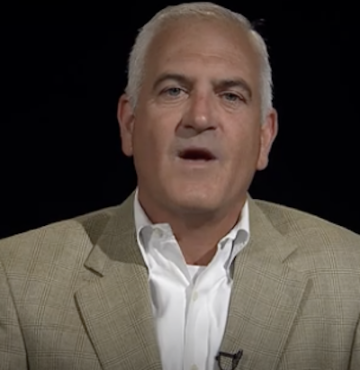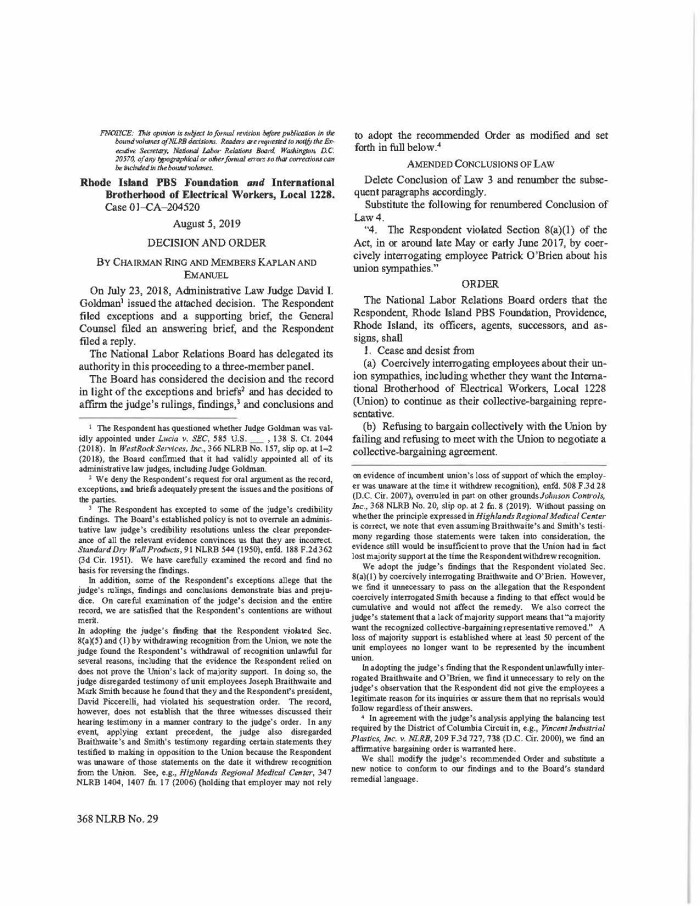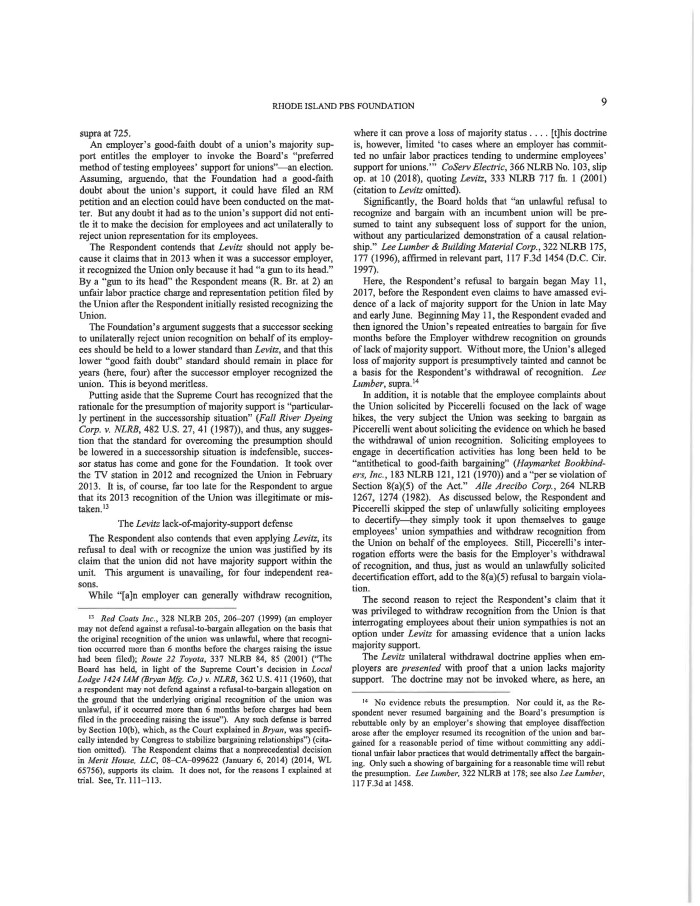Rhode Island PBS Ordered to Cease and Desist From Coercive Abuse of Employees by NLRB
Wednesday, August 07, 2019
A three-judge panel of the National Labor Relations Board has ruled that Rhode Island PBS was coercive in its treatment of employees -- and tried to break a local union.
The sweeping decision orders RI PBS -- the local public broadcasting station -- to cease and desist from “coercively interrogating employees about their union sympathies.”
The decision orders RI PBS to fairly negotiate with the International Brotherhood of Electrical Workers, Local 1228.
GET THE LATEST BREAKING NEWS HERE -- SIGN UP FOR GOLOCAL FREE DAILY EBLASTThe 17-page decision is the latest -- and may be -- the final setback for the Rhode Island-based public television station that the NLRB says has been trying to break the union.
READ THE FULL DECISION BELOW
Anit-Union Environment Wasting Donations, Says Lawyer
“This case represents an organization---management, that has squandered tens of thousands of dollars (probably public contributions) on a plan that was not well thought out or executed. Whoever is responsible for this should be held accountable for this very poor judgment. It reeks of anti-union animus,” said attorney Thomas McAndrew.
The final decision by the NLRB was rendered after RI PBS had appealed an August of 2018 decision by David Goldman NLRB, who found that RI PBS had violated multiple federal labor standards.
The 2018 decision said that the public television station must immediately remediate 13 different elements of the violations.
Judge Goldman was appointed to the NLRB in September of 2005 by President George W. Bush.
The final decision of NLRB issued this week is equally damning for RIPBS.
“It's important because PBS sought to withdraw recognition of the IBEW and to relieve itself of negotiating with the union with respect to wages, hours and other terms and conditions of employment,” said McAndrew.
“They wanted to convert their operation from a union shop to a non-union shop and then have their employees ‘at will’ rather than governed by a contract with an arbitration clause that would prohibit PBS from arbitrarily and capriciously terminating employees,” said McAndrew.
“It would further prohibit the management from engaging in political shenanigans and limit their authority to hire and fire for ‘political’ reasons,” added McAndrew.
The NLRB found, "Here, there was no employee effort to remove the Union as representative. There was not even a decertification campaign for the employer to unlawfully assist or unlawfully instigate, because there simply was no employee effort to remove the Union. Here, the employer ferreted out employee dissatisfaction, through interrogation, found what it considered (wrongly) to be enough, and on that basis unilaterally withdrew recognition."
"The employees did not seek to remove their Union. The Respondent did. An employer's unilateral withdrawal of recognition must be based on an employee effort to reject unionization that proves lack of majority support, not based on an employer's unilateral decision that it would be in the employees' interest to reject the Union," wrote the NLRB.
PBS Responds
In response, RI PBS’ President David Piccerelli said in a statement to GoLocal, “The National Labor Relations Board has rendered their opinion against Rhode Island PBS on the Unfair Labor Practice filed by the International Brotherhood of Electrical Workers Local 1228. We respectfully disagree with their Decision and have 30-days to file an appeal. Accordingly, we are reviewing our legal options.”
The NLRB decision found, "In this case, considering all the circumstances, the unlawful nature of the questioning is not open to serious question. Here, the top official of the Respondent had what he described as "official" meetings, one-on-one, with three different employees in his office, outside of regular work routines, for the purpose of inquiring directly of them their views on union representation, and in Smith's case, the views of other employees on unionization. None of the employees were open union supporters or activists. This was decidedly not casual questioningPiccerelli wanted to know the employees' union sympathies..."
The station can appeal to the 1st Circuit U.S. Court of Appeals.
The case began in August 2017, when the International Brotherhood of Electrical Workers, Local 1228 filed an unfair labor practice charge against the public television station.
In April 2017, RIPBS announced that the public television station had a windfall of $94.4 million in the federal frequency auction.
"In a move to secure the future of public television in Rhode Island and southeastern Massachusetts, WSBE Rhode Island PBS President David Piccerelli …announced the station's successful participation in the Federal Communications Commission's (FCC) Broadcast Incentive Auction. WSBE Rhode Island PBS will receive $94.4 million to move its signal from its current location to a location lower in the television spectrum."
READ THE FULL NLRB DECISION BELOW
Related Slideshow: NLRB Decision Against RI PBS - August, 2019
Related Articles
- NLRB Finds RI PBS Violated Federal Law in Labor Dispute with IBEW Union
- Photo Emerges of Projo’s Investigative Reporter Hummel in Blackface
- RI PBS Promises Diversity, But ‘Lively Experiment’ Has Only Had One Minority Guest in Past 6 Months
- Media Explosion in RI - RI PBS Scores $94M, WPRO’s Parent Co. Collapse, Big Projo Changes
- Secretary of State Resigns Over Blackface in Florida — Taxpayer-Funded RI PBS Defends Hummel
- Union Raises Questions About Projo Outsourcing to Hummel Report - Non-Profit with Conservative Ties
- R.W. Alley: “Hummel Report’s Failure to Find the Issue”





































